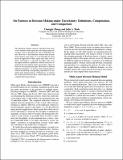On fairness in decision-making under uncertainty: Definitions, computation, and comparison
Author(s)
Zhang, Chongjie; Shah, Julie A
DownloadShah_On fairness.pdf (203.2Kb)
OPEN_ACCESS_POLICY
Open Access Policy
Creative Commons Attribution-Noncommercial-Share Alike
Terms of use
Metadata
Show full item recordAbstract
The utilitarian solution criterion, which has been extensively studied in multi-agent decision making under uncertainty, aims to maximize the sum of individual utilities. However, as the utilitarian solution often discriminates against some agents, it is not desirable for many practical applications where agents have their own interests and fairness is expected. To address this issue, this paper introduces egalitarian solution criteria for sequential decision-making under uncertainty, which are based on the maximin principle. Motivated by different application domains, we propose four maximin fairness criteria and develop corresponding algorithms for computing their optimal policies. Furthermore, we analyze the connections between these criteria and discuss and compare their characteristics.
Date issued
2015-01Department
Massachusetts Institute of Technology. Computer Science and Artificial Intelligence Laboratory; Massachusetts Institute of Technology. Department of Aeronautics and AstronauticsJournal
Proceedings of AAAI'15 Proceedings of the Twenty-Ninth AAAI Conference on Artificial Intelligence
Publisher
Association for Computing Machinery (ACM)
Citation
Zhang, Chongjie and Julie A. Shah. "On fairness in decision-making under uncertainty: Definitions, computation, and comparison." AAAI'15 Proceedings of the Twenty-Ninth AAAI Conference on Artificial Intelligence, 25-30 January, 2015, Austin, Texas, USA, Association for Computing Machinery, 2015. pp. 3642-3648.
Version: Author's final manuscript